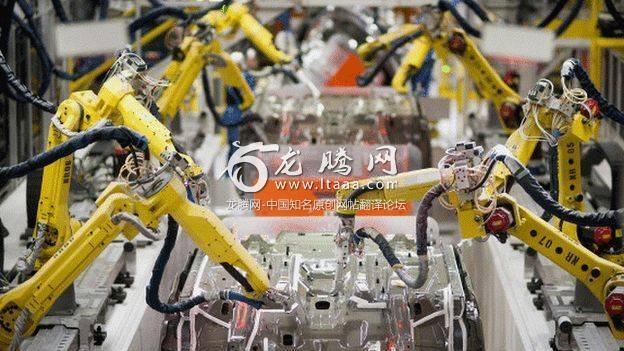印度是否能成为人工智能的中心? [英国媒体]
印度政府智囊团最近发表的人工智能报告预测,印度将成为发展中国家的人工智能中心。研究分析师ShashankReddy写下了这种可能性发生的情况。
A recent report on artificial intelligence (AI) by an Indian government think tank foresees the country as an AI hub for the developing world. Research analyst Shashank Reddy writes about the possibility of that happening.
印度政府智囊团最近发表的人工智能报告预测,印度将成为发展中国家的人工智能中心。研究分析师ShashankReddy写下了这种可能性发生的情况。
India is the latest country to join the race to lead the AI revolution, which is still in the making. The world's richest - and most powerful - countries have long been in this competition. It cuts across all spheres of national power, from the economy to the military, because the idea is that leadership in AI will enable global dominance.
印度是最新一个参与领导人工智能革命的国家,这场革命仍在酝酿之中。世界上最富有,最强大的国家长期以来一直在这场竞争中。它的影响贯穿全球,从经济到军事,因为其理念是谁掌握了人工智能谁就能掌控这个世界。
The two biggest powers so far have been the United States and China, with each investing heavily in AI and its applications. So does India stand a chance?
到目前为止,最大的两个大国是美国和中国,它们都对人工智能及其应用进行了大量投资。那么印度有机会吗?
Yes, according to a report released this month by think tank Niti Aayog.
是的,根据智库Niti Aayog本月发布的一份报告。(注释:改智库属于印度政府。)
What India can offer
印度能提供什么
The report - which has been drafted as a "national strategy on AI" - admits that India lags significantly behind the superpowers in fundamental research and resources. Compared to the United States, it has fewer researchers and only a handful of dedicated laboratories and university departments. India also does not have tech giants such as Google and Amazon or behemoths like Baidu and Alibaba - all companies that can afford to invest in cutting-edge research.
这份起草的“国家人工智能战略”的报告承认,印度在基础研究领域和资源拥有方面远远落后于超级大国。与美国相比,它的研究人员较少,专门的实验室和大学系也寥寥无几。印度也没有谷歌(Google)和亚马逊(Amazon)这样的科技巨头,也没有百度(Baidu)和阿里巴巴(Alibaba)这样的庞然大物,他们都是有尖端科技可以投资的公司。
But India enjoys crucial advantages too. It has a vast engineering workforce, a burgeoning start-up scene and an increasing amount of data as more people buy smartphones and go online.
但印度也享有至关重要的优势。随着越来越多的人购买智能手机和上网,它拥有庞大的工程人员队伍,一个新兴的创业场景,以及越来越多的数据。
The report itself is the latest in a slew of recent endeavours by the Indian government to encourage AI research. The federal government has created special committees to explore the possibilities AI offers in various sectors, from commerce to defence, as well as the issues that could arise from its widespread use. This year's budget allocated money to develop a national AI strategy.
这份最新的报告本身是印度政府最近为鼓励人工智能研究,而做出的一系列努力。联邦政府成立了特别委员会,以探讨人工智能在各个部门提供的可能性,从商业到国防,以及广泛使用人工智能可能产生的问题。今年的预算拨款用于制定国家人工智能战略。
Part of that strategy envisions India becoming an "AI garage" of sorts for most of the developing world - a platform for AI-led social innovations, what the report describes as #AIforAll. The report identifies five areas that would benefit most from AI intervention: healthcare, agriculture, education, "smart cities" and infrastructure, and urban transport.
该战略的部分野心是,印度将成为“人工智能车库”,最差也是对大多数发展中国家国家来说是一个引领人工智能创新的平台,根据#AIforAll的报告(注释:AIforAll查不到是谁,难道是人名或者智库?),该报告确定了五个将从人工智能政策中受益的领域:医疗保健、农业、教育、“智能城市”和基础设施以及城市交通。
Hurdles to overcome
需要克服的障碍:
The report also understands the challenge in deploying AI on a massive scale. For one, it is expensive. Secondly, there is a dearth of resources. India currently lacks the expertise to do the research and apply it - and it also doesn't have the vast networks of data to enable AI. Lastly, there is little awareness about the technology and the risks it poses to privacy and security. Regulation of data - how it is collected and used - is still at a nascent stage, which makes powerful technologies like AI vulnerable to misuse.
报告还解释了大规模部署人工智能面临的挑战:首先,它是昂贵的。第二,资源匮乏。印度目前缺乏进行研究和应用的专门知识,而且它也没有庞大的网络数据来支持人工智能。最后,人们对这项技术及其对隐私和安全构成的风险知之甚少。对数据的监管,数据的收集和使用方式,仍处于初级阶段,这使得人工智能这样的强大技术很容易被滥用。
But the report sets out a two-tier plan to overcome these barriers and boost AI research. It envisages that top Indian universities will take charge of fundamental research while specialised centres will collaborate with the private sector to lead the application of AI.
但该报告提出了一项两级计划,以克服这些障碍,推动人工智能研究。该计划设想,印度顶尖大学将负责基础研究,而专业研究中心将与私营部门合作,领导人工智能的应用。
This is ultimately expected to lead to the founding of a national "AI marketplace" that will aid innovation - an Indian version of what has been called a "Cern for AI", a reference to the world's largest particle physics laboratory in Switzerland.
这最终将导致建立一个全国性的“人工智能市场”,这将有助于创新,并最终产生印度版本的“欧洲核子研究中心”类似的人工智能中心。指的是位于瑞士的世界上最大的粒子物理实验室。
Hopes for new markets
对新市场的野望:
What stands out about the report is its suggestion that India cannot and will not compete with China in the AI realm - instead it will play to its advantages by becoming a global AI hub for non-Chinese and non-Western markets.
这份报告的突出之处在于,它暗示印度不能、也不会在人工智能领域与中国竞争,相反,它将发挥自己的优势,成为一个面向非中国和非西方市场的全球人工智能中心。
What about AI's potential impact on jobs? The report is silent on this issue and with good reason.
人工智能对现有工作的潜在影响如何呢?报告有充分的理由对这个问题保持沉默。
A lot of the arguments in favour of and against AI are still speculative, especially in relation to India. It is possible that the use of AI could eliminate certain jobs that exist now. But, as has happened elsewhere, it is also highly likely that AI will create a new class of jobs. It is too early to know either way.
许多赞成和反对人工智能的论点仍然是推测性的,尤其是与印度有关的。人工智能的使用有可能会消除目前存在的某些工作。但是,正如其他地方所发生的那样,人工智能也极有可能创造出新的就业岗位。要知道现在这两种方法都为时尚早。
The report declares India's ambition to carve a niche for itself in an increasingly AI-driven world. It should not be seen as the government's final strategy but only as a credible first step in a drawn-out, and potentially transformative, policy.
这份报告宣称,印度的雄心壮志是在一个人工智能发展快速的世界中为自己创造一个商机。它不应被视为政府的最终策略。而应被看作是制定一项具有潜力变革的政策的可行性的第一步。
版权声明
我们致力于传递世界各地老百姓最真实、最直接、最详尽的对中国的看法
【版权与免责声明】如发现内容存在版权问题,烦请提供相关信息发邮件,
我们将及时沟通与处理。本站内容除非来源注明五毛网,否则均为网友转载,涉及言论、版权与本站无关。
本文仅代表作者观点,不代表本站立场。
本文来自网络,如有侵权及时联系本网站。
图文文章RECOMMEND
热门文章HOT NEWS
-
1
最近,新冠肺炎疫情在日本有扩大的趋势,有专家呼吁日本应当举国行动起来,共...
- 2
- 3
- 4
- 5
- 6
- 7
- 8
- 9
- 10
推荐文章HOT NEWS
-
1
最近,新冠肺炎疫情在日本有扩大的趋势,有专家呼吁日本应当举国行动起来,共...
- 2
- 3
- 4
- 5
- 6
- 7
- 8
- 9
- 10













